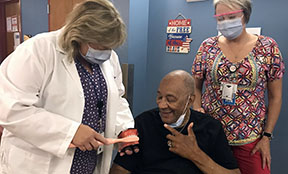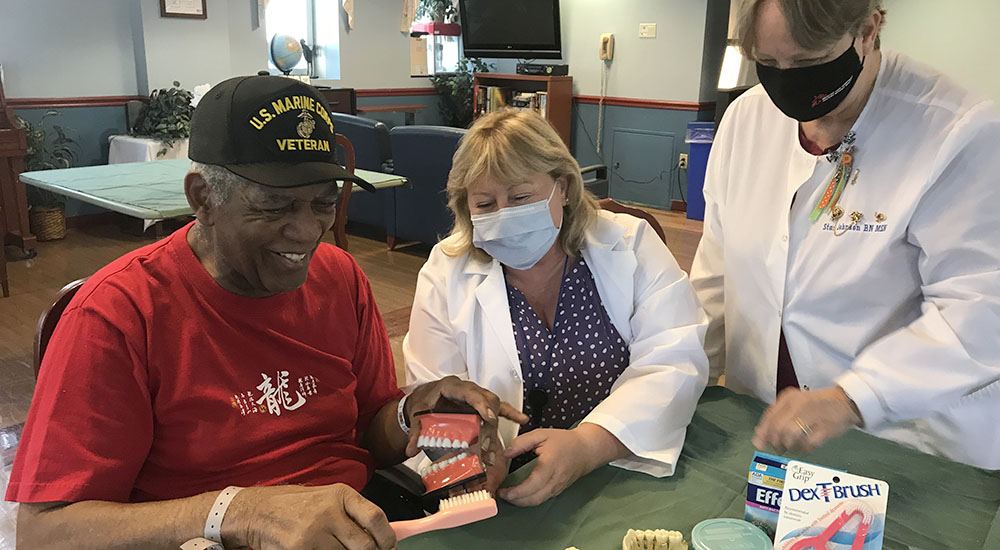VA is using a surprisingly simple life-saving weapon and it’s not new, nor is it high-tech: It’s a toothbrush, and along with good oral hygiene, it can prevent deaths from pneumonia.
Poor oral hygiene is associated with a greater chance of developing pneumonia in hospitals. “That’s because not taking care of teeth can lead to plaque which creates a bacteria-friendly environment in the mouth,” said Suzanne Hook, chief nurse for Administration/Operations at the VA Maryland Health Care System. “That bacteria can easily travel down the throat and into the lungs, causing a pneumonia infection. And pneumonia can lead to sepsis, which is nearly always fatal to vulnerable patients.”
Consistent oral care cuts risk of pneumonia
“Providing consistent oral care to Veterans in hospitals and long-term care residents cuts the risk of developing hospital-acquired pneumonia in half, thus saving lives,” Hook said.
Pictured above, dentist Karen Phillips demonstrates proper brushing to Veteran James Howard, assisted by nurse Star Johnson.

Dentist Karen Phillips reinforces the importance of oral hygiene with Veteran William Higdon, assisted by nurse Angelica Albanese.
Hook leads nurses at the VA Maryland Health Care System in an initiative to achieve zero hospital acquired pneumonias related to mouth care. She works in collaboration with Dental and other services, using Project HAPPEN, (Hospital Acquired Pneumonia Prevention by Engaging Nurses to provide oral care). Project HAPPEN began at the Salem VA Medical Center in 2016.
A best practice throughout VA
Project HAPPEN significantly reduces rates of pneumonia in hospitalized patients. It is a best practice throughout VA for its ability to save lives.
Oral care is not new at the VA Maryland Health Care System. Staff document it daily in a patient’s records, a practice already established with intensive care patients.
The program is becoming available to all levels of care. The roll out is starting with Veterans residing in community living centers and acute care patients.
Eventually, efforts to raise awareness about the link between daily basic oral care and pneumonia will extend to all staff and Veterans receiving outpatient care throughout the health care system.
Positive impact for Veteran patients
“In terms of money and time, the investment per hospitalized patient is minimal,” Hook said. “Just a few dollars for supplies – toothbrushes, toothpaste, denture cleaner, lip moisturizers – and a few minutes per nursing shift to perform oral care for each patient or to remind those who are able to, to do it themselves. We like to say, we’re making things HAPPEN. And we’re excited about the positive impact Project HAPPEN can have for our Veteran patients.”
Ming T. Vincenti is a public affairs specialist and the community outreach coordinator for the VA Maryland Health Care System.
Topics in this story
More Stories
Bob Jesse Award celebrates the achievements of a VA employee and a team or department that exemplifies innovative practices within VA.
The Medical Foster Home program offers Veterans an alternative to nursing homes.
Watch the Under Secretary for Health and a panel of experts discuss VA Health Connect tele-emergency care.







The discussion always seems to return to the basic motivations; the American Government doesn’t value the people who are beyond their days of active contributions. By proxy, the American People learn these ‘values’ because money not made available for senior care and mental health “leaves more money in the pockets of taxpayers.” When a civil servant learns to make the value judgment ‘the needs of the many outweigh the needs of the one’ society is missing the point.
It is disingenuous to passively suggest a hospitalized veteran would seek dental care outside of the hospital. Duty should be a VA watch-word, foremost.
Furthermore, the VA researchers should stay on the case. At some point in the near future they should recognize that teeth also affect the quality and quantity of the food we ingest. Healthcare can be tricky, sure, but it does not need to be expensive.
Why isn’t there more offered for veterans for dental care considering poor dental leads to heart problems and other issues.
VA : Poor oral hygiene is associated with a greater chance of developing pneumonia in hospitals. In another article today on Mil-Times they reported how routine hearing and eyesight care reduces overall Health costs and Hospital visits. Yet, Tricare only provides 1 Vision exam every 2 years and the VA denies my request for a Hearing test and Dental Care. However If I wanted to “reaffirm my gender” I’d be eligible for Psychiatric Counseling, Hormone Therapy and a Sex Change Operation! Jus Sayin…
They don’t mention routine toothbrush replacement after illness or thorough cleanse/sterilization.
Interesting article. Dental care is not provided b the VA so I’m surprised it was published. My understanding has always been dental/oral care is the personal responsibility of veterans.
If your 100% rated VA covers Dental. But for ME, I go south to the Border, Quicker, Fit Better, and T’m temped To get The implants are About 1/3rd the cost here.. LOL 80 y o with stage 4 lung cancer holds me back.
As a veteran working as a volunteer to help the poor and homeless including veterans in the northern Virginia area for 20 years, poor and non-existent oral hygiene is at the top of the list of issues among almost every “guest”. City and county resources for dental care among the poor and homeless are so scarce that months waits for appointments are typical. I hope that is not the case in the VA system of healthcare because the article cited how poor oral hygiene can result in pneumonia. The solution is to provide the resources so that outreach programs can attempt to inform the vet and follow up which I know is difficult. But the VA can lead.
There have been instances of veterans being exposed to infections such as hepatitis and HIV due to improper sterilization of dental handpieces. When is the VA going to go to single-use sterile dental handpieces?
This is all apart of the process not to catch cov19 and thar is real talk